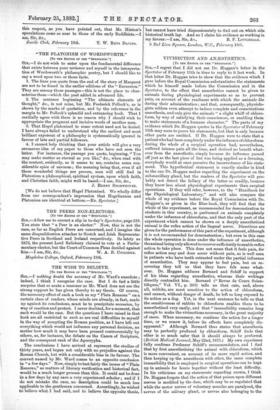" THE PLATONISM OF WORDSWORTH. "
[To THE EDITOR OF THE"SPECTATOR."] Sra,—I do not wish to enter upon the fundamental difference that exists between your reviewer and myself in the interpreta- tion of Wordsworth's philosophic poetry, but I should like to say a word upon two or three facts.
1. The lines you quote from the end of the story of Margaret are not to be found in the earlier editions of the " Excursion." They are among those passages—this is not the place to char- acterise them—which the poet added in advanced life.
2. The sentence beginning "The ultimate elements of -thought," &c., is not mine, but Mr. Frederick Pollock's, as is shown by the marks of quotation, and by the reference in the margin to Mr. Pollock's splendid and entrancing book. That I -cordially agree with them is no reason why I should wish to appropriate the pregnant and incisive words of another man.
3. That Hegel platonised to some extent need not be denied. I have always failed to understand why the earliest and most brilliant exponent of a philosophy is systematically ignored in favour of late and partial followers.
- 4. I cannot help thinking that your article will give a very -erroneous idea of my paper to those who have not seen the latter. For instance, the passage you quote, beginning, " You may make matter as eternal as you like," &c., when read with the context, evidently, as it seems to me, contains some con- siderable spice of sarcasm ; the meaning being that, even if all these wonderful things are proven, men will still find in Platonism a philosophical, spiritual system, upon which faith, and Christian faith, might well be based.—I am, Sir, &c., J. HENRY SHORTHOTJSE.
[We do not believe that Hegel Platonised. We wholly differ from our correspondent's impression that Hegelianism and Platonism are identical at bottom.—En. Spectator.]


































 Previous page
Previous page